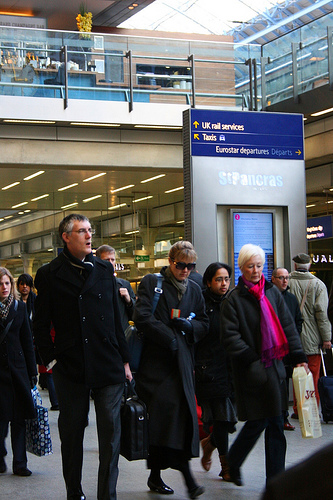APTA: Lack of investment in public transport may kill jobs
Is adequate transportation linked to jobs? A study recently released at a U.S. Capitol Hill briefing reveals that companies in America’s “most productive” areas will soon require more public transport options — or be forced to cut jobs. That report, “The Role of Transit in Support of High Growth Business Clusters in the U.S.,” was carried out by the Economic Development Research Corp. and commissioned by the American Public Transportation Association (APTA). It estimates that by 2040, 480,000 new jobs — representing $32 billion yearly in income — would be at risk because of congestion and inadequate public transport.
As APTA president and CEO, Michael Melaniphy, explained, “Public transportation provides the access to enable high-tech and high-growth industries to cluster in areas that can attract the talent they need, while avoiding the consequences of constrained growth. Public transportation investment is a key ingredient in helping these firms enhance their productivity and compete on a global stage.”

APTA points to a disconnect between the kind of economy the U.S. labor force can sustain and the transportation infrastructure that’s been built to sustain that labor force. From bareknuckleyellow.
The report analyzed eight “key high-growth and high-tech business clusters” throughout the country, among them business centers in San Francisco, Atlanta, Boston, Silicon Valley, Deerfield (Illinois), Denver, and Seattle, with the goal of investigating the effect that lacking transportation access exerts.
The report also contends that the U.S. economy is undergoing a major change. In the future, it states, an incommensurate amount of American jobs will be available in knowledge-based industries which are “most successful” when located near one another. Such companies have location requirements, and depend upon employees, who, in turn, require public transport options.
The American economy is reliant upon businesses like these, states the report. According to President of the Economic Development Research Corp. and author of the report, Glen Weisbrod, technology-oriented and high-growth business sectors depend upon “clustering” in urban areas with easy access to “R&D centers, information sharing, and a large, skilled workforce.”
Reliable transportation is necessary for these types of companies and their employees. “Only with robust, reliable and safe public transportation systems can we begin to unlock the country’s true economic potential,” U.S. Representative Dan Lipinski, who is co-chair of the Public Transportation Caucus, said at the U.S. Capitol Hill briefing. “As our economy continues to evolve in the 21st century, it is imperative that we provide employers and workers with more options to connect people to jobs. Improving public transportation is a critical part of meeting this goal.”
And what about cars? This report confirmed earlier research that found that auto congestion can negatively impact productivity and growth in “densely developed areas,” by adding to commuting times — and even “potentially eras[ing] the economic benefits that would otherwise be available” in densely developed areas. The report also references local government officials, from around the country, who say that added highway miles is detrimental to growth, because of the lack of available space in highly developed areas.
The APTA, which commissioned the report, is a nonprofit international association comprised of 1,500 public and private sector transport organizations, including bus, light rail, commuter rail, subways, waterborne transport, high-speed and intercity rail, and paratransit groups.
Category: Infrastructure















